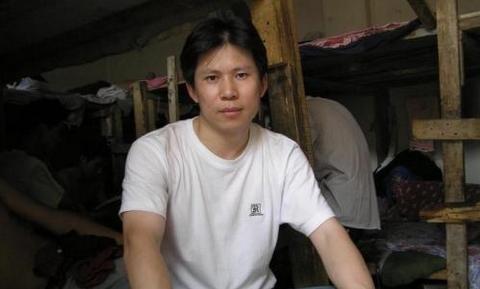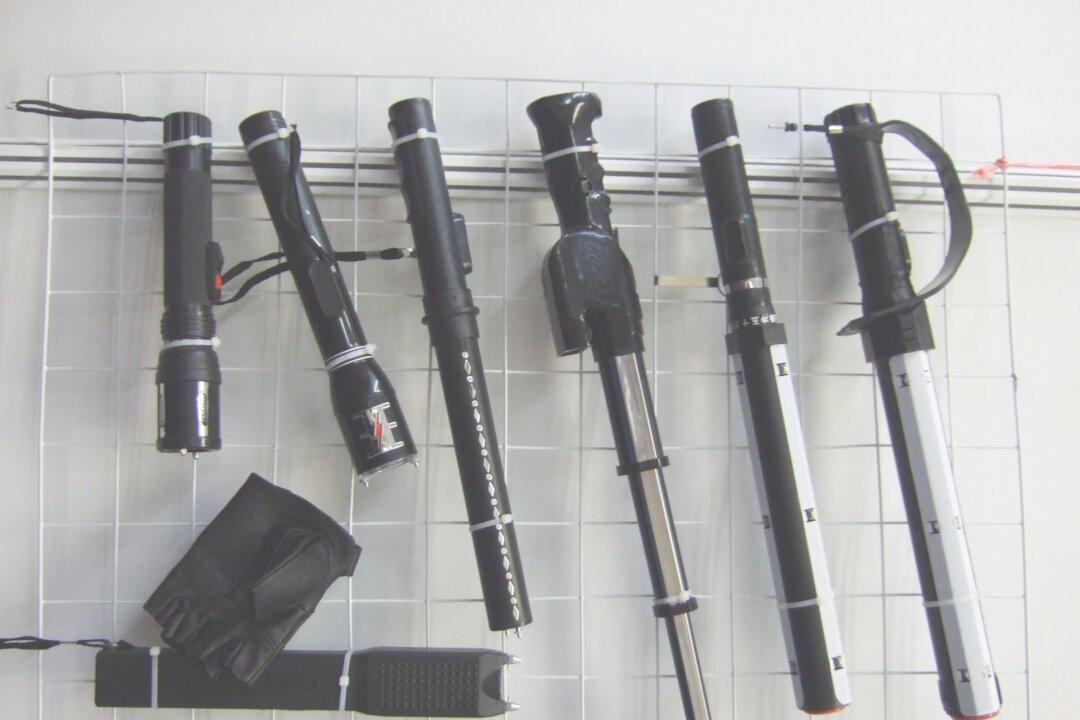A pre-trial hearing on Friday for Chinese human rights and political reform activist Xu Zhiyong will set into motion another high profile court case, highlighting the communist regime’s sincerity in repressing dissent.
Xu’s lawyer, Zhang Qingfang, told The Guardian that the exact date of the trial was still uncertain, and that Xu is hoping for a fair trial.
Xu is one of the founders of the “New Citizens Movement,” a loose network of grassroots activists who promote legal and human rights reform and constitutional government. Xu has been particularly prominent in calling for constitutionalism, democracy, and rule-of-law reforms.
Xu was arrested in July, but Beijing police did not file their case with the prosecutor’s office until December, charging Xu with disturbing the public order by organizing demonstrations.
His lawyer said that if the court bars defense witnesses from testifying, which is common in politically sensitive cases, Xu himself will refuse to speak at the hearing, according to The Guardian.
Barring witness testimony is not the only action taken by Chinese judicial officials that would surprise Western readers used to an independent legal system. Some of the other familiar activities carried out by the Communist Party around sensitive political trials include the following:
1. Media Directives
The State Council Information Office issues censorship instructions to the media, telling them what to say or not say, or even forbid them to mention the trial at all.
Censorship instructions for the December 2012 trial of asset disclosure activists Liu Ping, Wei Zhongping and Li Sihua in Jiangxi Province included instructions to delete all online news on the case, and particularly any news related to the comments and actions of their lawyers. They were also to strictly control discussion on social media sites, according to watchdog website China Digital Times.
2. Keep Away
Lawyers attempting to see their clients are routinely denied pretrial contact. When the case comes to trial, defense lawyers are locked out of the court house and courtroom.
Lawyer Cheng Hai has posted in his website that he is one of seven lawyers who are forbidden to visit their clients on orders from higher authorities.
Police prevented lawyer Liu Weiguo from seeing Xu Zhiyong at a Beijing Detention Center. Officers then detained Liu himself at a Public Security Bureau police station, where police reportedly beat him.
Before one session of Jiangxi activists Liu Ping, Wei Zhongping and Li Sihua’s trial, the defendants’ lawyers were held up at a police checkpoint for an hour, finally walking to the courthouse.
“Plainclothes police and many cars formed a blockade surrounding the court,” Guo Haiyue, one of eleven lawyers defending Falun Gong practitioners in northeast China, told New Tang Dynasty (NTD) Television.
3. No Photographs
In order to keep publicity at a minimum, police prevent photography, even of public buildings.
Rights defender Zhou Li, a friend at the trial of the Jiangxi activists, told Human Rights In China (HRIC): “I was trying to take pictures of the gates of the court house but was dragged by five policemen into a van.”
The police took Zhou in for questioning, strip searched her and locked her in a cage for 25 hours.
4. No Witnesses
In the trial of the Jiangxi activists, police placed witnesses and family members under house arrest.
Liao Min, the daughter of activist Liu Ping, told Radio Free Asia (RFA) that none of the witnesses for the trial of the Jiangxi activists were allowed to leave their homes. In some cases police even moved in with the families to keep them under surveillance.
5. No Calling
Police confiscate or inactivate cell phones of lawyers, witnesses and family members.
Police guards confiscated the cell phone of Beijing defense lawyer Wang Quanzhang when he tried to use it to photograph evidence he was submitting in court.
Before and during the trial of the Jiangxi activists, police turned off the cell phones of the defense witnesses who were under house arrest.
Police repeatedly tried to take the cell phones of defense lawyers trying to meet their clients in the Nanle Church case in Henan Province.
6. Bring in the Goons
Officials hire busloads of goons to harass defense family, lawyers, witnesses and news crews at the courthouse.
Outside the court in the Jiangxi activists trial, the defense lawyers were hounded by a crowd of 200 to 300 hired goons who shoved them and shouted insults at them.
In the Nanle County Church case, the bus load of hired hasslers called the lawyers traitors and scumbags, defense attorney Pu Zhiqiang said. “The hostile crowd attacked the defense lawyers, local Christians, and us,” a Sky News correspondent said in his statement.
Another attorney for the detained Christians, explained, “They are paid and backed by the local government. They come and go as required. All this is organized behind the scenes by the government,” saying that the same group had attacked him the day before.
7. Gag Defendants
Judges prevent defense lawyers from presenting evidence or speaking in court.
Six top human rights lawyers said court officials would not allow them to finish their arguments in the October 2013 trial of the three Jiangxi Province activists.
A trial of 13 practitioners of Falun Gong in Laioning Province ended when the judge refused to allow one of the defense lawyers to present evidence. When defense lawyer Cheng Hai tried to show the judge a video on his laptop, the judge shouted him down, had him removed from the courtroom, and locked up.
When Chen Xi and his lawyer Sun Guangquan presented their defense arguments during Chen’s trial, they were repeatedly interrupted by the judge. Chen Xi was not allowed to give his final statement.
8. Keep it All a Secret
Lawyers and families are kept in the dark about when trials are scheduled, in violation of the regulations.
In the Jiangxi trial, the defense lawyers were concerned that the trial was closed. Si Weijiang, an attorney for Liu Ping, told Radio Free Asia, “The court has violated regulations on holding open trials.”
Defense lawyers were furious when they found out about the trial of Falun Gong practitioners in Liaoning Province only the day before, and were not notified days beforehand so they could prepare—a violation, they said, of judicial procedures.
9. Deter Lawyers
Public security police often beat defense lawyers before and during the trial.
Top rights lawyer Cheng Hai told Reuters he was beaten by uniformed police after being denied the right to defend 13 Falun Gong practitioners. Cheng said that around 10 officers punched him in the face, kicked him, and ripped his clothing while he was waiting outside a Dalian courthouse in April of 2013.
Cheng told The Telegraph that it was the fourth time that he was beaten while on the case. He said he had been beaten in the past, but the current situation “is definitely getting worse.”
“Some of the lawyers were beaten,” rights lawyer Liu Weiguo told RFA, speaking of an incident when a dozen lawyers tried to meet clients in the Nanle County Church case. “Fortunately, they weren’t seriously injured.”
10. … Or Lock Them Up
Defense lawyers are frequently jailed when trying to meet with, or defend their clients in court.
Liu Weiguo, defense lawyer for activist Xu Zhiyong, was seized by police in July, after he attempted to visit Xu and was sent to a black jail.
Beijing rights defense lawyer Wang Quanzhang went to court to defend Falun Gong practitioner Zhu Yanian, and was thrown into detention himself in April 2013.
11. Leave Nothing to Chance
Trials of human rights activists do not comply with international fair trial standards. With the lack of independent courts, verdicts are pre-determined with a conviction rate at first instance of over 98 percent, according the Office of the UN High Commissioner for Human Rights.
Democracy activist Chen Wei was sentenced to nine years for “inciting subversion of state power.” His lawyer, Liang Xiaojun, said: “The verdict was predetermined, the trial was unlawful! I’m speechless, I really have no words to describe it.”
China’s Foreign Ministry rejected Secretary of State John F. Kerry’s appeal for the release of Xu and Liu Xiaobo, saying that they had violated Chinese laws, implying that Xu’s conviction was a foregone conclusion.
“They deserve to be punished by law,” spokesman Hong Lei said at a routine news conference. “I need to emphasize that only the 1.3 billion Chinese people are best qualified to pass judgment over China’s human rights condition.”




